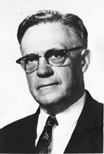James C. Liao
Chemical and Biomolecular Engineering
University of California, Los Angeles
A Tale of Two Butanols: Exploring Metabolism for Fuels and Chemicals
Abstract
Four-carbon alcohols (n-butanol and isobutanol) have recently attracted significant attention, both because of their desirable fuel properties and their roles as chemical feedstock. n-Butanol was produced in large scales by Clostridium species; isobutanol was detected as a minor product in wine fermentation. To produce large quantities efficiently to serve as next-generation fuels and chemical feedstock, multiple intrinsic and extrinsic challenges exist for metabolic engineers. n-Butanol is an end-product of catabolism; isobutanol is an off-tract product of anabolism. There are thermodynamically unfavorable reactions in the n-butanol pathway; there are natural driving forces in the isobutanol pathway. There are sugars, cellulose, protein, and carbon dioxide as carbon sources; there are sunlight, electricity, and hydrogen to power the reactions. There are enzymes sensitive to oxygen; there are reactions lacking proper reducing partners. In both pathways the products are more toxic than the cells can tolerate. Yet, we managed to overcome these difficulties and used the two compounds as springboards to explore various possibilities in the energy space.
Bio
Dr. James C. Liao received his B.S. degree from the National Taiwan University and Ph.D. in 1987 from the University of Wisconsin-Madison under the guidance of Professor Edward Lightfoot. After working as a research scientist at Eastman Kodak Company in Rochester, N.Y., he started his academic career at Texas A&M University in 1990 and moved to UCLA in 1997 where he is now the Chancellor's Professor of Chemical and Biomolecular Engineering at the UCLA Henry Samueli School of Engineering and Applied Science. Dr. Liao is a pioneer in the fields of metabolic engineering, systems biology, and synthetic biology. Dr. Liao's current research focuses on metabolic engineering of microorganisms for the production of fuels and chemicals. Dr. Liao is recognized for his groundbreaking work recycling carbon dioxide for the biosynthesis of higher alcohols. This process turns CO2 — a greenhouse gas produced by burning fossil fuels — into products that can be used in alternative transportation fuels or chemical feedstock, reducing greenhouse emissions and providing for cleaner, greener energy worldwide. He has authored over 150 manuscripts and mentored over 40 graduate students and 20 postdocs, 9 of which are now faculty members across the world. Dr. Liao is a co-founder of Gero, Inc a biotechnology company focused on the production of alcohols for fuel and chemical applications.
Dr. Liao's work has been recognized with numerous awards. He was elected Fellow of the American Institute for Medical and Biological Engineering in 2002 and has received numerous awards including the NSF Young Investigator Award (1992), Merck Award for Metabolic Engineering (2006), FPBE Division award of American Institute of Chemical Engineers (AIChE) (2006), Charles Thom Award of the Society for Industrial Microbiology (2007), Marvin J. Johnson Award of the American Chemical Society (2009), Alpha Chi Sigma Award of AIChE 2009), James E. Bailey Award of the Society for Biological Engineering (2009), and Presidential Green Chemistry Challenge Award (2010).
Please see Dr. Liao's website here.

